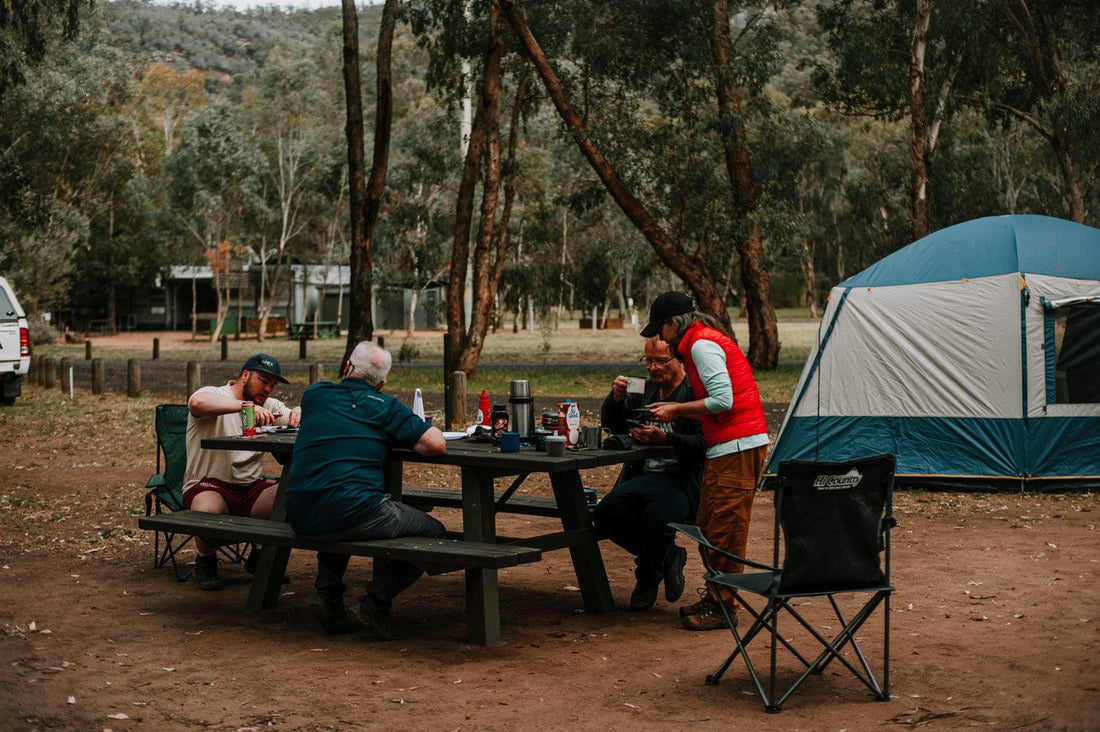
Organising a Group Camping Trip
Share
Organising a Group Camping Trip
Group camping trips can be fun — organising them, however, can be a nightmare akin to herding cats. No one knows what’s going on, you bring things you don’t end up needing, forget the things you desperately do, and before you know it you’re MacGyvering a rope out of braided garbage bags and a shoelace.
But with a little planning (and maybe a shared spreadsheet or two), you can turn that chaos into a genuinely enjoyable weekend away with family or mates — one that doesn’t end with everyone vowing never to camp together again.
Pick a Leader — or Divide and Conquer
Every group needs some kind of organiser. Whether that’s one person taking charge or everyone handling different jobs, it’s worth deciding early on.
Having one organiser makes decisions faster — they can choose the site, coordinate bookings, and send reminders about who’s bringing what. The downside? That person can quickly become the default “camp mum” and may end up fielding every question from “What time are we leaving?” to “Has anyone seen my toothbrush?”
Dividing responsibilities can take the pressure off — one person books, another handles food, another checks gear — but it only works if everyone actually remembers their jobs and follows through. If your group leans toward the forgetful side, you might want to stick with a benevolent dictator.
Pack in Tubs, Not Chaos
Skip the random bags and piles of loose gear — pack your supplies in plastic storage tubs. They’re easy to stack, carry, and keep organised. It also helps to think about what you’re putting into them: pack together the things you’ll use together, like cooking utensils, meals, or first aid supplies.
Go for tubs of the same size and brand so they stack neatly when empty. Label them by category — Cooking, Sleeping Gear, Food, First Aid, Miscellaneous Stuff You’ll Definitely Forget to Put Away Later.
You’ll thank yourself when you’re packing up in the rain and everything actually fits back into the car.
Powered Campsites — A Game Changer
Yes, going camping is about getting back to nature and living a more simplified life for a few days. But on group trips, you may find yourself going slightly insane without a few modern conveniences.
If you can, book a powered site. It keeps the group together and stops the inevitable power crusade where half the group disappears trying to find an outlet to charge phones, fridges, and fairy lights.
It can also make things like cooking easier, as you can use electric cookware instead of gas or a campfire — which may be banned during warmer months due to fire danger.
Just remember to bring a power board and a 15-amp extension cord long enough to reach everyone’s setup — nothing tests group harmony faster than limited access to electricity.
Share the Cooking (and the Cleaning)
Rotate meals so everyone gets a turn. Not only does it spread the workload, it also means you get a fun variety of food — and someone else’s take on bacon and eggs.
Create a shared meal plan beforehand so you don’t end up with three tubs of tomato sauce and no bread. Whoever cooks doesn’t clean, and whoever cleans gets the first shower (if there is one).
Prep what you can before you leave — mix dry ingredients together and keep them in a ziplock bag ready for the wet ingredients to be added at camp. Separate meal portions, and pack them in order: last meal at the bottom of the storage tub, first meal at the top.
Bring an Extra Tent
If you’ve got the space, bring one extra tent. It doesn’t need to be fancy — even an old dome tent will do. It’s incredibly handy as a shared storage area for group gear like eskies, chairs, and spare food, or as a makeshift kitchen when the weather turns.
It also gives everyone somewhere to sit that’s away from the bugs when the mozzies start doing fly-bys. Think of it as your group’s utility room in the bush — not glamorous, but you’ll wonder how you ever camped without it.
Things You Might Not Think to Pack
- Ziplock bags for leftovers or muddy clothes
- Extra garbage bags — always more than you think
- Dishwashing soap, scourer, and a tea towel to dry
- Water — campground taps aren’t always safe for drinking or cooking
- A lantern or fairy lights for shared areas
-
A washing line and pegs — lifesavers for drying towels
- A lightweight tarp — can be strung up as an awning, used as a ground cover, or thrown over a leaky tent to keep the rain out (don’t forget rope)
- If you have a powered site, bring an electric kettle for boiling water fast
Bonus Tips
- Group chat everything. A quick message thread keeps everyone updated and prevents double-ups.
- Plan for weather. A shared tarp or marquee can save the day if it rains.
- Leave space for spontaneity. The best group memories usually happen when plans go sideways anyway.